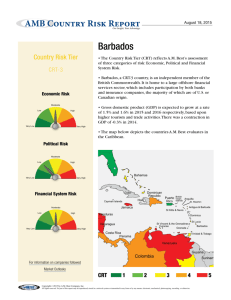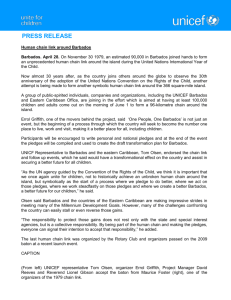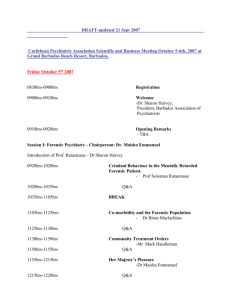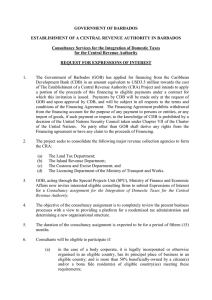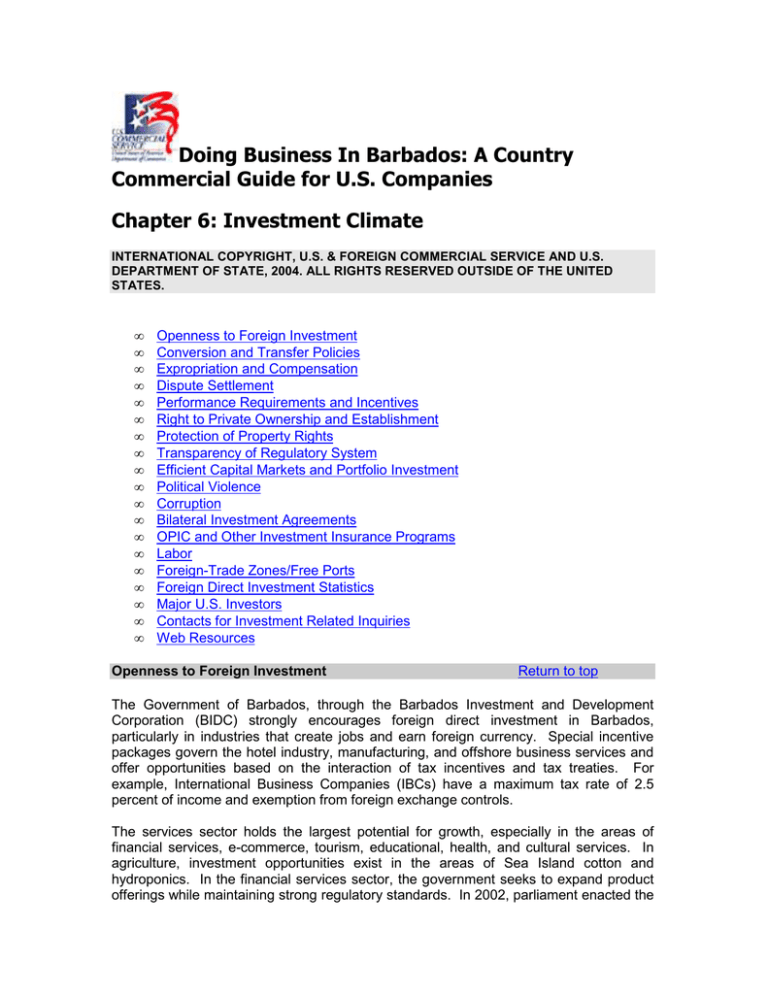
Doing Business In Barbados: A Country
Commercial Guide for U.S. Companies
Chapter 6: Investment Climate
INTERNATIONAL COPYRIGHT, U.S. & FOREIGN COMMERCIAL SERVICE AND U.S.
DEPARTMENT OF STATE, 2004. ALL RIGHTS RESERVED OUTSIDE OF THE UNITED
STATES.
•
•
•
•
•
•
•
•
•
•
•
•
•
•
•
•
•
•
•
Openness to Foreign Investment
Conversion and Transfer Policies
Expropriation and Compensation
Dispute Settlement
Performance Requirements and Incentives
Right to Private Ownership and Establishment
Protection of Property Rights
Transparency of Regulatory System
Efficient Capital Markets and Portfolio Investment
Political Violence
Corruption
Bilateral Investment Agreements
OPIC and Other Investment Insurance Programs
Labor
Foreign-Trade Zones/Free Ports
Foreign Direct Investment Statistics
Major U.S. Investors
Contacts for Investment Related Inquiries
Web Resources
Openness to Foreign Investment
Return to top
The Government of Barbados, through the Barbados Investment and Development
Corporation (BIDC) strongly encourages foreign direct investment in Barbados,
particularly in industries that create jobs and earn foreign currency. Special incentive
packages govern the hotel industry, manufacturing, and offshore business services and
offer opportunities based on the interaction of tax incentives and tax treaties. For
example, International Business Companies (IBCs) have a maximum tax rate of 2.5
percent of income and exemption from foreign exchange controls.
The services sector holds the largest potential for growth, especially in the areas of
financial services, e-commerce, tourism, educational, health, and cultural services. In
agriculture, investment opportunities exist in the areas of Sea Island cotton and
hydroponics. In the financial services sector, the government seeks to expand product
offerings while maintaining strong regulatory standards. In 2002, parliament enacted the
International Financial Services Act to meet international standards on supervision and
regulation of financial institutions and e-commerce. They also passed a comprehensive
Tourism Development Act in late 2002 and recently enacted amendments to the
Insurance Act, Companies Act, Trademarks Act, and Patents Act.
The government introduced a new telecommunications framework in 2000 to end the
long-standing monopoly, introduce competition, lower the cost of international
telecommunications, and enhance the telecom infrastructure. Legislation passed in
December 2001 set the stage for telecom liberalization and in March 2003, the
government awarded new cellular licenses to Cingular (AT&T Wireless at the time),
Digicel, and Sunbeach Communications. In October 2004, the government awarded
fixed wireless access licenses to TeleBarbados, WIISCOM, and Last Mile Holdings, and
awarded an undersea cable landing license to Antilles Crossing. The former monopoly,
Cable and Wireless, and the government agreed to liberalize the long distance sector by
February 21, 2005. Long distance rates remain relatively high, but should come down
once the long distance market opens for competition. To prepare a workforce skilled in
advanced IT services, the government and educational institutions such as the Barbados
Community College and the University of the West Indies have undertaken educational
and training initiatives.
Foreign nationals receive the same protections as local citizens. Barbados is proud of
its tradition of the rule of law. By Caribbean standards, the police and court systems are
efficient and unbiased in commercial matters, and the government operates in an
essentially transparent manner.
Local enterprises generally welcome joint ventures with foreign investors in order to
access technology, expertise, markets, and capital. Barbados’s economy is small,
however, and new enterprises that might compete with entrenched local establishments,
especially in the retail and restaurant sector, may face a de facto veto of their license by
local interests. Importers of U.S. ice cream and poultry products, and franchisees
interested in establishing a McDonald’s, TGI Friday’s, and Subway have all been denied
access to the Barbados market.
Conversion and Transfer Policies
Return to top
The Ministry of Finance controls the flow of foreign exchange, and the Exchange Control
Division of the Central Bank of Barbados executes policy under the Exchange Control
Act. Individuals may apply through a local bank to convert the equivalent of USD 3,750
per year for personal travel and USD 25,000 for business travel. To convert anything
over these limits, one must apply to the Central Bank. Companies can freely repatriate
profits and capital from foreign direct investment if they registered with the Bank at the
time of investment. The Central Bank may limit or delay conversions depending on the
level of international reserves under the bank's control.
Expropriation and Compensation
Return to top
The Barbados Constitution and Companies Act contain provisions that permit the
government to compulsorily acquire property for public use upon prompt payment of
compensation at fair market value. The Embassy is not aware of any outstanding
expropriation claims or nationalization of foreign enterprises in Barbados.
Dispute Settlement
Return to top
Barbados bases its legal system on the British common law system. The Attorney
General, the Chief Justice, Puisne Judges, and Magistrates administer justice in
Barbados. The highest court of appeal is currently the Privy Council in London, although
the new Caribbean Court of Justice may soon replace the Privy Council as the highest
court of appeal for CARICOM nations.
The United States and Barbados are both parties to the World Trade Organization
(WTO). The WTO Dispute Settlement Panel and Appellate Body resolve disputes over
WTO agreements, while courts of appropriate jurisdiction in both countries resolve
private disputes. The Barbados Arbitration Act (1976) and the Foreign Arbitral Awards
Act (1980), which recognizes the 1958 New York Convention on the Negotiation and
Enforcement of Foreign Arbitral Awards, contain provisions for arbitration of investment
disputes. Parliament has written The New York Convention’s provisions into domestic
law, but has yet to ratify the convention. Barbados is a member of the International
Center for the Settlement of Investment Disputes (ICSID), also known as the
Washington Convention.
Additionally, individual agreements between Barbados
multilateral lending agencies have provisions calling on Barbados officials to accept
recourse to binding international arbitration to resolve investment disputes between
foreign investors and the state.
Performance Requirements and Incentives
Return to top
Performance requirements and expectations are central to the administration of certain
foreign direct investments. Local officials will more likely approve licenses if they believe
the investment will create jobs, increase exports and foreign exchange earnings, and
increase economic activity in Barbados. There are no requirements for participation
either by nationals or by the government in foreign investment projects. To receive a
work permit for top management, the company must show that a Barbadian national or
resident cannot fill the position. Work permits are of two types, short-term (for six months
or less) and long-term (usually for no more than three years).
There is no requirement that enterprises must purchase a fixed percentage of goods
from local sources, but the government encourages local sourcing. Export performance
requirements exist for certain industries. For example, “enclave enterprises” must
produce goods exclusively for export outside the CARICOM region. Foreign investors
must finance their investments from external sources or from income that the investment
generates. When a foreign investment generates significant employment or other
tangible benefits for the country, the authorities may allow the company to borrow locally
for working capital. There is no requirement that locals own shares of a foreign investor's
enterprise, but some restrictions may apply to share transfers. The Companies Act does
not permit bearer shares. Foreign investors do not need to establish facilities in any
specific location, although there are zoning and other restrictions.
Most investment incentives in Barbados are tax incentives, although there are some
special programs for manufacturers.
In the manufacturing sector, The Barbados Investment and Development Corporation
(BIDC) has established ten well-equipped industrial parks with subsidized rent. The
BIDC may also supply limited training grants and free technical assistance through two
programs with a focus on developing local businesses, the Export Grant and Incentive
Scheme and the Technical Assistance Program. The former helps both locally and
foreign-owned companies (but only those foreign companies with management or
marketing branches in Barbados) by defraying export costs such as the preparation and
shipment of samples and the development of marketing materials. The latter helps
companies solve a range of operational problems. The BIDC also offers local small
businesses access to its Small Business Development Center, with conference room
facilities, communications services, short-term office space, and a commercial library.
To further help manufacturers, the Central Bank of Barbados has established an export
credit guarantee scheme, covering pre-shipment financing requirements and postshipment credit risks for manufacturing companies.
The Fiscal Incentives Act (1974) provides a maximum 10-year tax holiday to any
manufacturer of an approved product, provided that it meets the definition of an enclave
enterprise: manufacturing exclusively for export outside of CARICOM; manufacturing
approved products containing a specified percentage of local value added; or being
highly capital intensive. Under the Fiscal Incentives Act, such enterprises may import
duty-free equipment, spare parts, and raw materials from outside CARICOM. Dividends
and other distributions to shareholders during the tax holiday are also exempt from the
payment of income tax. Non-resident shareholders liable to tax in their country of
residence are subject to Barbados withholding tax at a lower rate. To qualify for these
incentives, the enterprise must apply to the Ministry of Economic Development.
Enterprises not obtaining benefits under the Fiscal Incentives Act and generating export
profits (other than from exports within CARICOM) may receive an export allowance
expressed as a rebate of corporation tax (between 35-93 percent) on those profits. The
maximum rebate of 93 percent applies if more than 81 percent of an enterprise’s profits
result from extra-regional exports. Such enterprises are also entitled to a 50 percent
rebate of the import duty applicable to all imports for use in manufacturing. Companies
may request additional relief from the Customs Department based on the ratio of exports
to local production. The Export Development Allowance allows a company to deduct
from taxable income an additional 50 percent of what the company spends in developing
export markets outside CARICOM.
Initial Allowances or Investment Allowances of up to 40 percent on capital expenditure
are available for businesses making capital expenditures on machinery and plants, or on
an industrial building or structure. Annual depreciation allowances on such expenditures
are also available. Under Section 14A of the Income Tax Act, any manufacturing
company in Barbados can enjoy tax reductions based on the percentage of its profits
derived from export income, as follows:
Rebate of Income Tax as a percent of Total Export Profits
Total Export Profits
Up to 20 percent
More than 20 and up to 40 percent
More than 40 and up 60 percent
More than 60 and up 80 percent
Over 80 percent
Rebate Of Corporation Tax
35 percent
45 percent
64 percent
79 percent
93 percent
In the tourism sector, a Market Development Allowance allows a company to deduct an
additional 50 percent of what it spends encouraging tourists to visit Barbados. Under the
Tourism Development Act of 2002, businesses and individuals that invest in the tourist
sector can write off capital expenditure and 150 percent of interest. They are also
exempt from import duties, the value added tax, and environmental levies on furniture,
fixtures and equipment, building materials, supplies, and equity financing. The act
expands the definition of tourist sector to include not just accommodation, but
restaurants, recreational facilities, and services. The Act encourages the development
of attractions that emphasize the island’s natural, historic, and cultural heritage, and also
encourages construction of properties in non-coastal areas. The Minister of Tourism
must approve all projects under this legislation.
Regarding taxation, Barbados has entered into double taxation treaties with the United
States, Canada, CARICOM, China, Cuba, Finland, Norway, Sweden, Switzerland, U.K.,
and Venezuela. A new amendment to the tax treaty between the U.S. and Barbados
went into effect on January 1, 2005. The revised tax treaty strengthens measures to
prevent U.S. companies from using Barbados as a tax shelter on income earned in the
United States.
Offshore businesses may operate either free of income tax (e.g., captive insurance,
foreign sales corporations) or with a tax rate from 1 to 2.5 percent. An International
Business Company (IBC) must by the terms of its incorporation export 100 percent of its
manufacture in order to enjoy the following tax rates on gains and profits:
Gains and Profits
Up to USD 10 million
USD 10-20 million
USD 20-30 million
Over USD 30 million
Corporate Tax Rate
2.5 percent
2.0 percent
1.5 percent
1.0 percent
An IBC may import machinery and equipment into Barbados free from certain taxes and
customs duties. IBC’s also are exempt from withholding tax and tax on the transfer of
their assets and may also make certain foreign exchange transactions free of exchange
controls. IBC’s in the information services sector receive a special tax rate of 2.5
percent on profits, full exemption from import duties on production-related equipment,
including computers, full and unrestricted repatriation of capital, profits, dividends, rental
of subsidized office space, and training grants to subsidize worker training.
International financial service companies also enjoy several tax incentives. Under the
Exempt Insurance Act, a company incorporating with a minimum capital of USD 125,000
and at least one Barbadian director is eligible for taxation on profits at zero percent for
the first fifteen years, and 2 percent on the first USD 250,000 of profits thereafter, as well
as exemption from withholding tax and exchange control restrictions. Its beneficial
shareholders also must not be persons resident in CARICOM. In 1998, legislation
allowed companies involved in the international insurance businesses to register as
Qualifying Insurance Companies, entitled to a tax rate of 2.8 percent, after deducting a
foreign currency earnings allowance, and exemption from withholding taxes and
exchange controls.
The International Trust Act allows non-residents to create trusts for the benefit of nonresidents, with no minimum capital requirements and no withholding taxes, but subject to
40 percent tax on profits earned in or remitted to Barbados. Societies of Restricted
Liability, which may not acquire land in Barbados or transact business with CARICOM
residents, enjoy certain concessions for up to 30 years, including exemption from
exchange controls and withholding tax on dividends, royalties, interest, or other interest
paid to non-residents. The European Union’s 2001 WTO challenge to U.S. Foreign
Sales Corporations (FSC) has eliminated the exemption to U.S. taxes previously
enjoyed on profits derived from FSC export sales.
The Shipping Incentives Act of 1982 provides concessions to shipping companies
engaged in the operation of passenger ships, leasing of ships, shipbuilding,
maintenance or repair. The concessions include a ten-year exemption on tax and
custom duties on materials connected with the shipping activities.
Right to Private Ownership and Establishment
Return to top
There is a constitutional right for nationals and non-nationals to establish and own
private enterprises and private property in Barbados. These rights also pertain to the
acquisition and disposition of interests in private enterprises. No industries are officially
closed to private enterprise, although the government reserves the right not to allow
certain investments (such as in the case of McDonalds, TGI Friday’s and others.) Some
activities, such as utilities, broadcasting, banking, and insurance, require a license from
the government. There are no percentage or other restrictions on foreign ownership of a
local enterprise or participation in a joint venture.
The Government of Barbados has been engaged for the past eight years in efforts to
divest itself of a number of costly and often unprofitable parastatal enterprises. To date,
the government has achieved partial or total divestment of most state-owned
enterprises, leased public facilities to the private sector, permitted private management
of parastatals, sought incorporation of government developmental operations, allowed
new project installations to have build-operate-transfer arrangement, and encouraged
management or staff buy-outs of state-owned enterprises or facilities.
Privatization is a major element of Barbados’s ongoing structural adjustment process.
Since 1992, the government sold BDS $61.7 million in commercial property to private
investors through the sale of shares in Barbados External Telecommunications (to Cable
& Wireless of the U.K.), Barbados Telephone Company (to Cable & Wireless), Barbados
Mills, the Arawak Cement Company, Barbados Dairy Industries, Barbados National Oil
Company, National Petroleum Corporation, Barbados Tourism Investment Inc., and
Heywoods resorts. In 2000, the government sold shares of the Barbados National Bank
and Insurance Corporation of Barbados to the public.
Protection of Property Rights
Return to top
The Barbados Government has improved the legal regime for property rights, including
intellectual property. Barbados signed the Paris Convention on Intellectual Property
Rights (IPR), the Madrid accords, and is a member of the United Nations World
Industrial Property Organization (WIPO). The Government of Barbados adopted a new
Copyright Act in August 1998, and amended it in 2004 to provide for tougher penalties.
The government also approved legislation in September 1998 for Integrated Circuits
Topography and Protection against Unfair Competition and Geographical Indications. In
addition, the government recently revised The Trademark and Industrial Designs Acts to
meet world standards. Legislation to comply with the World Trade Organization (WTO)
Agreement on Trade Related aspects of Intellectual Property rights (TRIPS) for Patent
and Plant Variety Protection is in an advanced stage. Article 45 of the Protocol
Amending the Treaty that established CARICOM commits all 15 members to implement
stronger IP protection and enforcement. Barbados must amend its domestic laws prior
to accepting international treaties and this is a lengthy process. Infringement in most
areas is small-scale, although video stores rent black market DVD’s and videos and
stores sell black market copies of computer software, designer items, music, videotapes,
CD’s and DVD’s.
Civil law protects physical property and mortgage claims.
Transparency of Regulatory System
Return to top
Barbados uses transparent policies and effective laws to foster competition and
establish clear rules for foreign and domestic investors in the areas of tax, labor,
environment, health, and safety. The principal regulatory agencies are the Ministry of
Finance and the Ministry of Economic Development.
The Ministry of Finance regulates the Exchange Control Authority of the Central Bank of
Barbados, including inward investment, registration of foreign capital, currency accounts,
and repatriation of capital and earnings. Local on-shore companies must meet fairly
stringent exchange control requirements, but the government welcomes investment by
non-residents with external sources of financing.
The Ministry of Economic Development administers the Companies Act and other
statutes dealing with company affairs. The Companies Act is modeled on the Canada
Business Corporations Act, and creates flexibility and simplicity for the incorporation and
operation of companies in Barbados.
Companies using or manufacturing chemicals need the Barbados Investment and
Development Corporation (BIDC) to approve their environmental and health practices.
The Ministry of Commerce, Consumer Affairs, and Business Development on rare
occasions imposes price controls, listed in the Official Gazette.
Barbados enacted legislation in 2000 to create the Fair Trading Commission (FTC) to
provide consumer protection in telecommunication and utility services. There is no
specific antitrust legislation in Barbados.
The Minister of Industry and International Business or the Minister of Finance must
approve foreign investment. The Chief Town Planner must approve new construction or
changes in land use. Zoning restrictions protect agricultural land, and the government
pursues policies to ensure environmental integrity.
The Central Bank must approve real property purchases for non-residents. If a nonresident uses foreign funds and pays for the property in Barbados, the Central Bank will
normally approve the transaction. When they sell the property, non-residents need to
pay the 18 percent Property Transfer Tax in addition to brokerage and legal fees. The
Commissioner of Land Tax charges an annual fee based on the assessed property
value. The government taxes Hotels on 50 percent of the improved value at 0.7 percent,
and residential properties on 100 percent of the improved value at between 0.2 and 1
percent.
Efficient Capital Markets and Portfolio Investment
Return to top
Local policies seek to facilitate the free flow of financial resources, unless there is a
shortage of funds. The Government has intervened in recent years in the local credit
market to raise or lower interest rates, limit the volumes of funds available for borrowing,
and borrow on the local market. There are a variety of credit instruments in the
commercial and public sectors that local and foreign investors may access.
The legal and accounting professions in Barbados are of a high quality and their
procedures are generally consistent with international norms. The government is
improving the system for regulating, encouraging, and facilitating portfolio investments.
The Bank Supervision Department of the Central Bank undertook a self-assessment in
2000, and found their on-shore and offshore sectors in general compliance with the
Basle Core Principles of Effective Banking Supervision utilizing the Basle Committee’s
Core Principles Methodology. The International Financial Services Act, which replaced
the Offshore Banking Act in June 2002, incorporates the Basle standards, and provides
for on-site examinations of offshore banks. This allows the Central Bank to augment its
offsite surveillance system of reviewing anti-money laundering policy documents and
analyzing prudential returns.
Under the authority of the Money Laundering (Prevention and Control) Act (1998), the
government established the Anti-Money Laundering Authority and its operating arm, the
Financial Intelligence Unit in 2000. The Bank Supervision Department issued in 2001
revised Anti-Money Laundering Guidelines for Licensed Financial Institutions. The
Barbados domestic financial sector consists of 6 domestic banks, 2 merchant banks, 38
credit unions and one money remitter. The offshore sector includes 4,635 international
business companies, 413 exempt insurance companies and 53 offshore banks
(November 2004 figures). Starting in 2001, the government required Barbados’s
institutions and legal entities to reveal the identity of beneficiaries receiving dividends or
interest, with the possible penalty for American companies of not getting the benefits of
the U.S.-Barbados tax treaty and being subject to the full U.S. withholding tax at a rate of
30-31 percent.
Assets of commercial banks totaled USD 3.5 billion in October 2004, and remained
relatively consistent throughout the year. The reserve requirement for commercial banks
is 16 percent of deposit liabilities and the minimum deposit rate is 2.5 percent. The
weighted average interest rate was 2.53 percent on deposits and 9.7 percent on loans in
October 2004, and has remained within half a percentage point of each of those levels
since 2002.
Domestic deposits expanded by BBD 406.6 million in 2004, following growth of BBD
441.3 million in 2003. Accounts of private individuals, business firms, and statutory
bodies recorded increases of BBD 248.9 million, BBD 243.9 million, and BBD 20 million
respectively.
Deposits of financial institutions declined by BBD 44.9 million and
government deposits declined by BBD 46.8 million.
Credit to the non-financial private sector expanded by BBD 313.3 million in 2004, several
times the BBD 23.4 million increase in 2003. Demand for residential mortgages drove
up personal lending by BBD 155.7 million. Lending to the financial, distribution, and
construction sectors increased in 2004, while credit to the tourism and agriculture
sectors declined.
The Securities Exchange Act of 1982 established the Barbados Stock Exchange (BSE)
to develop the capital market, assist companies to raise equity, and support the
Government’s privatization efforts. The BSE began trading corporate stocks, and
government bonds (not commercial paper) in 1997, including a cross-border trading
arrangement for shares listed on the Trinidad, Jamaica, and Bahamas stock exchanges.
On August 2, 2001, a new Securities Act introduced several adjustments to the Capital
Markets Regulation intended to strengthen infrastructure and transparency, encourage
foreign portfolio inflows, boost cross-border activity, and increase market liquidity.
Additionally, the Ministry of Finance passed regulation of the BSE and the 17 brokerdealers registered in Barbados to the newly created Securities and Exchange
Commission. The BSE requires company stocks listed on the Regular Market to provide
evidence of gross revenue or assets in excess of USD 500,000, adequate working
capital, competent company management and a positive dividend profile over three
consecutive years. Stocks traded on the Regular Market are denominated Ordinary,
Preferred, Put-through (formerly anonymous, electronic share transfers), and Junior
(shares of start-up and new small businesses that require lower capitalization
requirements to list). Reporting and disclosure requirements for all listed companies
include interim financial statements, and an annual report and questionnaire. Nonnationals must obtain exchange control approval from the Central Bank of Barbados to
trade securities on the BSE. A Justice of the Peace monitors all trades and adjudicates
transfers. In 2002, changes in the regulatory framework included the Regulations to the
Securities Act, the Take-Over Code Regulations and the Mutual Funds Act, which
transfers the regulation of funds to the Stock Exchange.
Stocks in Barbados surged up 32 percent in 2004. Cave Shepherd, a local department
store, performed the best, with a 141 percent increase for the year, followed by Goddard
Enterprises and Grace Kennedy and co. with increases of 109 percent and 97 percent
respectively. Trading on the BSE reached 122.2 million shares in 2004 at a value of
BBD 451.5 million (around USD 225 million), down in volume from the 130.2 million
shares traded in 2003, but up in value from BBD 394.8 million in 2003. During 2004,
nineteen of the twenty-six companies that trade on the BSE increased, five declined, one
traded firm, and another did not trade. In 2003, sixteen increased, eight declined, and
two traded firm.
The face value of Bonds traded in 2003 was BBD 1,794,400 as compared to BBD
22,517,000 in 2002.
Political Violence
Return to top
Political violence is unknown in Barbados.
Corruption
Return to top
Corruption is not a major problem in Barbados.
Bilateral Investment Agreements
Return to top
Barbados has no bilateral investment treaty with the United States, but has a double
taxation treaty and Tax Information Exchange Agreement. Barbados has bilateral
investment treaties with Canada (CARIBCAN), China, Cuba, Germany, Italy,
Switzerland, U.K., and Venezuela.
OPIC and Other Investment Insurance Programs
Return to top
In 1999, the Overseas Private Investment Corporation (OPIC), a development agency of
the U.S. government, signed with Citibank to establish a U.S. $200 million Investment
Facility for the Caribbean and Central America, as a means of encouraging investment
and stimulating economic development. The Caribbean Development Bank, which is
based in Barbados, administers this program. OPIC provides financing and political risk
insurance to viable private sector projects, helps U.S. businesses invest overseas, and
fosters economic development in new and emerging markets.
Labor
Return to top
In 2004, Barbados’ labor force was approximately 148,000, distributed in the following
sectors: commerce, tourism, government, manufacturing, construction, agriculture and
fishing sectors. Unemployment for 2004 was estimated at 9.9 percent.
Wages in Barbados are among the highest in the Caribbean. Minimum wages for only a
few categories of workers are administratively established and enforced by law. The
minimum wage for shop assistants, USD 2.13 per hour is only marginally sufficient to
meet minimum living standards. Most employees earn more. The standard workweek is
a 40-hour, 5-day week. Custom and practice dictate overtime payment for hours worked
in excess of 40 hours. Workers are guaranteed a minimum of fourteen days of annual
leave and are covered by unemployment benefits legislation and National Insurance
(social security) legislation.
Trade unions, and the leaders of the trade union movement, enjoy a unique and
generally respected position in Barbados. The major unions recognize the advantages
accruing to Barbados from foreign investment and foreign expertise, and they are
generally flexible and accommodating in their dealings with employers. Approximately
19-20% percent of the labor force belongs to trade unions, but this small percentage
belies the power and importance of unions in Barbados; all key sectors are unionized,
with all private and public employees in agriculture, tourism, and at the airport and
seaport belonging to a single union confederation.
Local labor leadership is sensitive when it perceives a lack of respect for Barbadian laws
and customs by large, visible foreign employers, but is generally cooperative with
management in unionized shops. In late 2002 and early 2003, workers at the new Hilton
complex walked off the job, protesting numerous terminations and what the called unfair
working conditions on the construction site, however, work on the site resumed shortly
after the walkout. There were no long-term work stoppages called by unions in 2004.
Barbados does not have labor legislation that mandates a legal process necessary for
unions to achieve status as bargaining agents, and employers have no legal obligation
to recognize unions under the Trade Act of 1954, but most employers do so when a
majority of their employees desire to be represented. Early contact and rapport with
Labor Ministry officials and union leaders by foreign investors could pay handsome
dividends in later labor harmony. Additionally, legislation to address termination of
employment and benefits is pending, and health and safety, sexual harassment, and
union recognition laws and regulations are currently being discussed at the Committee
level in Parliament.
Foreign-Trade Zones/Free Ports
Return to top
There are no foreign trade zones or free ports in Barbados.
Foreign Direct Investment Statistics
Return to top
The Government of Barbados compiles no official statistics on Foreign Direct Investment
(FDI). However, the Barbados Investment and Development Corporation (BIDC)
reported that BBD 26,694,227 was invested in 2004, up from BBD 9,798,518 in 2003
and BBD 8,604,936 in 2002. New investment totaled BBD 3,899,000 in 2004, up from
BBD 2,783,700in 2003 and BBD 1,350,000 in 2002. (Note: these are not official FDI
statistics, but are numbers based on a BIDC survey.)
Major U.S. Investors:
Return to top
American Airlines
Barbados Mills (Archer Daniels Midland)
Bondhus Corp.
Carib Supply (B’dos) Ltd.
Charles T. Gamble Industries
Chevron Texaco
Cingular Wireless
Cirrus Logic
Citicorp Merchant Bank
Continental Airlines
C F Caribbean Flavors
Ecolab Barbados Ltd. (joint venture)
Ernst & Young
Exxon Mobil
Federal Express
Lenstec Ltd.
MSI International Ltd.
Pricesmart Inc.
PriceWaterhouseCoopers
United Parcel Service (UPS)
U.S. Airways
Waggoner Barbados Ltd.
Contacts for Investment Related Inquiries:
Return to top
Barbados Investment and Development Corporation (BIDC)
Pelican House
Princess Alice Highway
Bridgetown
Barbados
Tel: 246-427-5350
Fax: 246-426-7802
Email: bidc@interport.net
Website: http://www.bidc@bidc.org
BIDC – Miami Office
130 Alhambra Circle, Suite 1000
Coral Gables, Florida 33134
Tel: 305-442-2269
Fax: 305-567-2844
BIDC – Los Angeles Office
3440 Wilshire Boulevard, Suite 1207
Los Angeles, California 90010
Tel: 213-380-2198
Fax: 213-384-2763
BIDC – New York Office
800 Second Avenue, 2nd Floor
New York, New York 10017-4709
Tel: 212-867-6420
Fax: 212-214-9815
Email: bidc@bidc.com
Ministry of Industry and International Business
The Business Center
Upton, St. Michael
Barbados
Tel: 246-430-2229
Fax: 246-228-6167
Website: http://www.barbadosbusiness.gov.bb
Web Resources
Return to top
Barbados Investment and Development Corporation (BIDC) Website:
http://www.bidc@bidc.org
Ministry of Industry and International Business Website:
http://www.barbadosbusiness.gov.bb
U.S. exporters seeking general export information/assistance or country-specific commercial
information should consult with their nearest Export Assistance Center or the U.S. Department
of Commerce’s Trade Information Center at (800) USA-TRADE, or go to the following website:
http://www.export.gov.
To the best of our knowledge, the information contained in this report is accurate as of the date
published. However, The Department of Commerce does not take responsibility for actions
readers may take based on the information contained herein. Readers should always conduct
their own due diligence before entering into business ventures or other commercial
arrangements. The Department of Commerce can assist companies in these endeavors.


